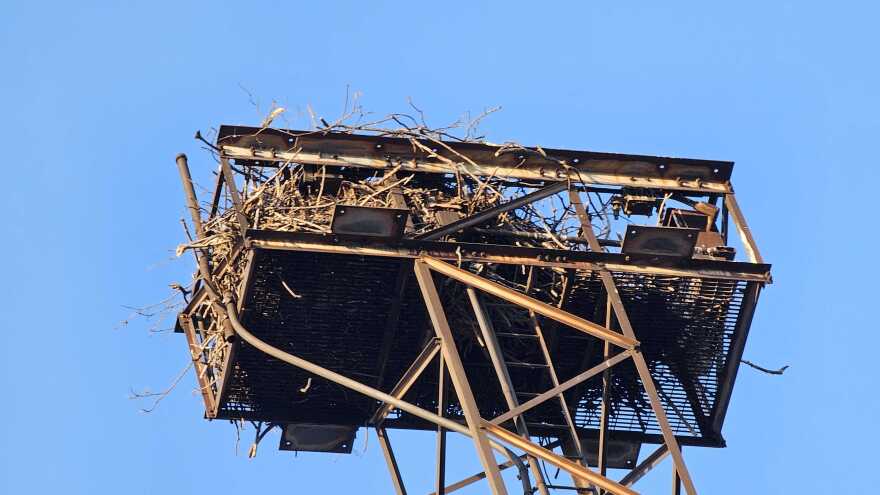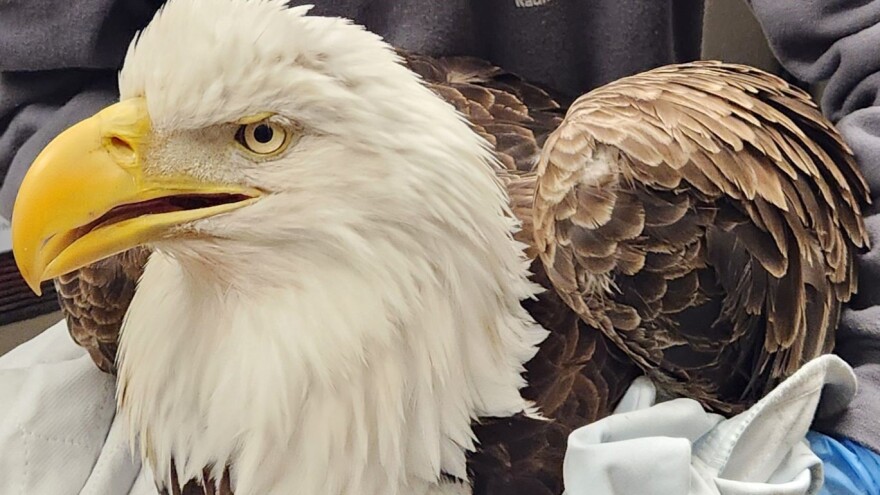BETHLEHEM, Pa. — A mature bald eagle that had nested for years with her mate at Saucon Park died Friday in quarantine at the Pocono Wildlife Rehabilitation and Education Center, officials there said.
The ailing eagle, unable to fly, was recovered Thursday from the park and was found to be gravid with one egg, according to wildlife center personnel.
Sampson Metzgar, lead avian specialist with the nonprofit wildlife hospital outside Stroudsburg, said the bird died before extensive blood work could be done, but initial tests came back negative for avian flu, lead poisoning and egg-binding.
“Metal toxicity, lead poisoning, poisoning in general — they all look the same to avian flu as well, which is why it’s so important that these birds are assessed at a rehab facility and can get the proper testing."Sampson Metzgar, lead avian specialist with Pocono Wildlife Rehabilitation and Education Center
More will be confirmed within a week as further testing could, instead, read positive for avian flu despite a negative result from initial, rapid testing — something Metzgar said is happening all too often recently.
“Metal toxicity, lead poisoning, poisoning in general — they all look the same to avian flu as well, which is why it’s so important that these birds are assessed at a rehab facility and can get the proper testing,” Metzgar said.
The eagle will be sent for a necropsy at the University of Pennsylvania’s New Bolton Center in Chester County.
Inability to fly reported early Thursday
The bird was set for a 10-day quarantine at the Wilderz at Pocono Wildlife in Hamilton Township, Monroe County, after the group received reports Thursday of the mother eagle’s grounding and inability to fly.
Metzgar said the bird began having seizures following the arrival of Pocono Wildlife, which handled the capture in Bethlehem jointly with the Pennsylvania Game Commission.

The fully grown female and her mate are known to nest in a tower along an old railroad bed near the Bethlehem-Hellertown border.
"This is quite the tragedy being the community has reported this eagle was nesting in that location for over eight years with the same mate," the wildlife center posted on social media.
"Please send her mate and juveniles from last year love and light," said the post.

All birds — especially ones displaying neurological symptoms — are tested for the often-fatal avian flu and quarantined upon arrival at the wildlife hospital, Metzgar said.
Affecting a variety of ducks, swans, geese, chickens and turkeys, avian flu symptoms in wild birds can include head bobbing, circling and general lack of function control.
“We have noticed that these birds are often in areas where they would not normally be, sometimes far from the rest of a flock, or on the side of the highway."Pocono Wildlife Rehabilitation and Education Center, on birds infected with avian flu
“We have noticed that these birds are often in areas where they would not normally be, sometimes far from the rest of a flock, or on the side of the highway,” the wildlife center wrote on its website.
Recently affecting 5,000 migratory snow geese and a 50,000-bird egg-laying chicken flock on a commercial farm in the area, bird flu — also called HPAI, or highly pathogenic avian influenza or H5N1 — has made an impact locally and beyond.
And the wildlife center says the virus doesn't just affect birds.

Other CDC data on cases in animals shows the following nationwide totals:
- 159,307,978 poultry affected as of Thursday, Feb. 14.
- 11,966 wild birds as of Tuesday, Feb. 11.
- 968 dairy herds affected as of Wednesday, Feb. 12.
- 16 states with dairy cows affected.
If you encounter a sick or dead wild bird, don't attempt to handle them, the center says.
Also, keep pets away from bird droppings, especially those of waterfowl.
Report the animals to the state Game Commission at 833-PGC-WILD (1-833-742-9453), or email pgc-wildlifehealth@pa.gov.
Come across a sick or dead domestic bird? Call the state Department of Agriculture at 717-772-2852.
Not as common, but still impacts humans
Even as local health officials prepare for the potential for human cases, it’s agreed that the overall risk remains low as of now.
And though avian flu can spread to other mammals — cases in humans may show a range of symptoms — it’s not anywhere as common as it is in wild birds.
Infections in humans come from the flu being present in a bird’s saliva, mucus and feces. The virus enters through a person’s eyes, nose or mouth.
Symptoms in humans include predominant eye redness and irritation (conjunctivitis), as well as cough, fever, sore throat, headaches and fatigue.
Resulting illnesses can range from a mild upper respiratory infection, to even pneumonia and multi-organ failure at its worst.
Keep in mind, that humans may also be infected through eating the meat of infected birds and drinking infected milk.
A broader look
CDC data lists 68 confirmed human cases nationally since 2024 — exposures have been tied back to 41 herds of dairy cattle, 23 poultry operations, three from unknown exposure and one exposure from another animal.
Early in January, news of the first case nationwide of a human dying from bird flu came out of Louisiana.
The United States has seen 68 confirmed human cases of avian flu since 2024. Exposure sources include 41 herds of dairy cattle, 23 poultry operations, three from unknown exposure and one exposure from another animal.U.S. Centers for Disease Control and Prevention
The AP reported the deceased, older than 65, experienced a mutation of the virus and “had underlying medical problems and had been in contact with sick and dead birds in a backyard flock.”
Here’s what U.S. Centers for Disease Control and Prevention says will keep poultry workers, public health responders and others who may experience such prolonged exposure safer on the job.
For now, there are no reported cases in Pennsylvania.


